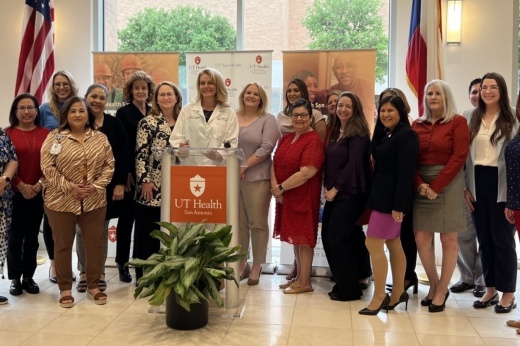The Ecumenical Center, a San Antonio-based nonprofit providing mental health care, said March 28 it has certified UT Teen Health, a local initiative promoting adolescent health and wellness, a Level 1 Trauma Informed Care center.
According to a news release, trauma-informed care refers to an organizational approach that address potential lifelong effects of trauma in families and emphasizes physical, psychological and emotional safety.
UT Teen Health is an initiative of UT Health San Antonio designed to help develop community solutions regarding teenagers struggling with trauma from sexual abuse, family violence, pregnancy, incarceration, food and shelter insecurity, or parental divorce or death.
The Ecumenical Center, a faith-based organization including community leaders in research, education, and medical and mental health professions, provide counseling children to adults and families.
Officials from UT Teen Health said it is important for health care organizations to have resources to help various community members cope with their challenges, such as teenagers and children dealing with mental health issues.
“What it means is understanding that everybody has a story, and you don’t ask, ‘What is wrong with you?’—but rather, ‘What has happened? Tell me your story,'” said Jennifer Todd, UT Teen Health project manager, in a statement. “When we approach people, our organizations and community with that question, we’re able to understand underlying causes.”
The release said the Ecumenical Center is the certifying entity for the South Texas Trauma-Informed Care Consortium—a collaboration among The Children’s Shelter, Voices for Children and the city of San Antonio Metropolitan Health District.
The consortium developed standards to ensure the highest level of adherence to trauma-informed approaches in all interactions with community members, the release said.
Ecumenical Center executive director and CEO Mary Beth Fisk said the Level 1 trauma designation means that UT Teen Health has completed comprehensive staff development of processes and procedures in trauma-informed care that enables people to feel safe, confident and valued.
UT Teen Health submitted its Level 1 certification credentials to The Ecumenical Center in June, culminating in its recent approval, UT Teen Health officials said.
“UT Teen Health’s leadership has worked to incorporate best practices into their everyday interactions with children and families, and we congratulate them on this important recognition,” Fisk said in a statement.
Todd said the certification reflects how well the local organizations are partnering to help improve overall community health.
“It shows the organizations that we work and partner with, and our community members, that we are dedicated to hearing their stories. So when they see that designation, they know that they’re going to be heard, that they’re going to be welcomed. And we have a place for them at the table at UT Teen Health,” Todd said in a statement.
The release said UT Teen Health partners with community youth-serving organizations and school districts to provide training and support on a wide range of topics, including adolescent growth and development, puberty, how to answer questions on sensitive topics, and providing trauma-informed care.
UT Teen Health Director Dr. Kristen Plastino said research shows that a person who has experienced multiple negative childhood experiences is more likely to have adverse health outcomes.
“So, when you see someone in the emergency room or clinic with high blood pressure or obesity, adverse childhood experiences may be contributing to their injury or diagnosis,” Plastino said in a statement. “Therefore, knowing there may be more to the story, not just taking the situation at face-value, allows us to provide a trauma-informed experience for the patient and also lets us explore other treatment approaches that take all these factors into consideration.”
In addition to UT Teen Health, the Ecumenical Center in March extended Level 1 Trauma Informed Care certification to two other local nonprofits, the Healy-Murphy Center and the Family Service Association of San Antonio.





